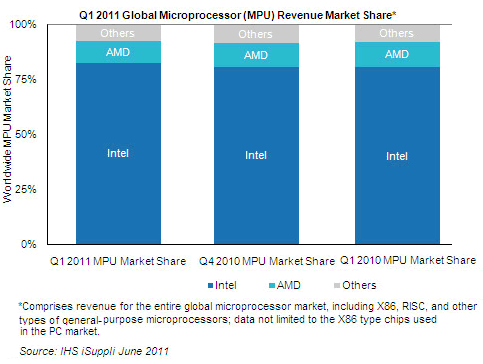
Intel Expands Microprocessor Share in Q1 Despite Sandy Bridge Recall
Despite a design problem that forced a large-scale chipset recall, Intel in the first quarter managed to pad its dominant position in the global microprocessor business, according to new IHS iSuppli research.
Intel during the first three months of 2011 accounted for 82.6 percent of global microprocessor revenue, up 1.6 points of share from the 81 percent it held in the fourth quarter of 2010. On a year-over-year basis, Intel gained 2.0 percentage points, IHS iSuppli said.
The figure below presents the IHS ranking of leading microprocessor suppliers in the first quarter of 2011. The market share numbers presented in the tables and this release include revenue for the entire global microprocessor market, including X86, RISC, and other types of general-purpose microprocessors; the data is not limited to the X86 type chips used in the PC market.

Intel in the first quarter discovered an error in the serial ATA controller in its core-logic chipset that supports the company?s Core Sandy Bridge microprocessors. The company said it would recall and replace about 8 million chipsets.
While such a major recall would represent a major setback for most companies, for giant Intel, it didn?t even cause a scratch.
"Intel moved quickly to identify and correct the Sandy Bridge chipset issue during the first quarter," said Matthew Wilkins, principal analyst, compute platforms, for IHS. "The fact that the company achieved a 25 percent increase in revenue in the first quarter of 2011 compared to the same period in 2010 shows that its chipset concern did not really affect the company to a significant degree. This serves as a testament to Intel?s capability to react to a potential crisis with speed and agility. Intel?s handling of the issue on both the public relations and business fronts stands in stark contrast to other recent examples of big companies facing major product quality challenges."
While Intel continued to gain, chief Intel rival Advanced Micro Devices Inc. (AMD) saw its share dwindle further. AMD accounted for 10.1 percent of global microprocessor revenue in the first quarter of 2011, down from 10.9 percent in the fourth quarter of 2010, and down from 11.8 percent in the first quarter of 2010. Despite its decline, both AMD and Intel continued to increase their collective domination of the microprocessor market, with the two companies holding a combined 92.7 percent share of revenue in the first quarter of 2011, up from 92.4 percent in the first quarter of 2010. This represents good news for the two dominant players, given that the worldwide microprocessor market expanded by about 20 percent in the first quarter of 2011 compared to the same period a year earlier.
While Intel continued to ride high in the first quarter, the company this year will face a challenge from the continued market advances of the media tablet.
Although Intel?s sales of its Atom microprocessor for netbook PCs rose in the first quarter, tablets will cut down shipments of netbook PCs this year. Media tablets, most notably Apple?s iPad, don?t employ dedicated microprocessors like Atom, instead using integrated chips that include processor cores.
The figure below presents the IHS ranking of leading microprocessor suppliers in the first quarter of 2011. The market share numbers presented in the tables and this release include revenue for the entire global microprocessor market, including X86, RISC, and other types of general-purpose microprocessors; the data is not limited to the X86 type chips used in the PC market.

Intel in the first quarter discovered an error in the serial ATA controller in its core-logic chipset that supports the company?s Core Sandy Bridge microprocessors. The company said it would recall and replace about 8 million chipsets.
While such a major recall would represent a major setback for most companies, for giant Intel, it didn?t even cause a scratch.
"Intel moved quickly to identify and correct the Sandy Bridge chipset issue during the first quarter," said Matthew Wilkins, principal analyst, compute platforms, for IHS. "The fact that the company achieved a 25 percent increase in revenue in the first quarter of 2011 compared to the same period in 2010 shows that its chipset concern did not really affect the company to a significant degree. This serves as a testament to Intel?s capability to react to a potential crisis with speed and agility. Intel?s handling of the issue on both the public relations and business fronts stands in stark contrast to other recent examples of big companies facing major product quality challenges."
While Intel continued to gain, chief Intel rival Advanced Micro Devices Inc. (AMD) saw its share dwindle further. AMD accounted for 10.1 percent of global microprocessor revenue in the first quarter of 2011, down from 10.9 percent in the fourth quarter of 2010, and down from 11.8 percent in the first quarter of 2010. Despite its decline, both AMD and Intel continued to increase their collective domination of the microprocessor market, with the two companies holding a combined 92.7 percent share of revenue in the first quarter of 2011, up from 92.4 percent in the first quarter of 2010. This represents good news for the two dominant players, given that the worldwide microprocessor market expanded by about 20 percent in the first quarter of 2011 compared to the same period a year earlier.
While Intel continued to ride high in the first quarter, the company this year will face a challenge from the continued market advances of the media tablet.
Although Intel?s sales of its Atom microprocessor for netbook PCs rose in the first quarter, tablets will cut down shipments of netbook PCs this year. Media tablets, most notably Apple?s iPad, don?t employ dedicated microprocessors like Atom, instead using integrated chips that include processor cores.





















